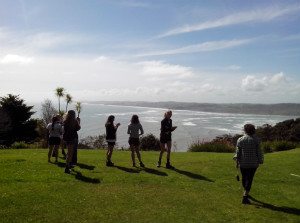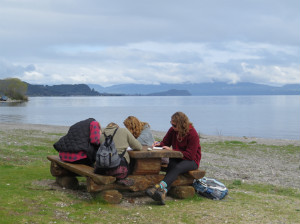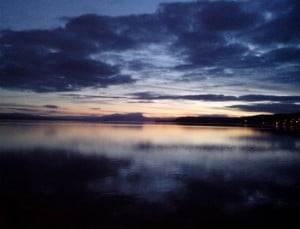How and when did you begin working for HECUA?
Charles: Ever had a learning experience that simply resonated on lots of levels? After working in policy, Treaty of Waitangi reconciliation and founding a literary magazine, I was invited into the HECUA vision by Program Director Peter Horsley.
I felt things falling into place; when I visited the HECUA staff and learned more about its awesome history and focus, I felt I had come home to a place and flow that matched my own passion for positive learning.
Did YOU study or intern abroad? If so, where and what inspired you to go?
Charles: Yes, I studied in Vancouver,Canada, and I was inspired by the books by the faculty there, its large salmon-bearing Fraser River and the beautiful surroundings of the region.
I was lucky enough that our first son was born there, so who knows what Kii-Canuck connections will emerge in the future. I have very fond memories of my time there and made great friends and had amazing mentors.
Why do you think HECUA’s model of internships + classroom time is so effective?

Charles: It's the variety that makes a compelling weave. The travel and then the skills extended and honed through internships offer a range of experiences that step you off-campus and into the next chapter of your life.
HECUA offers off-campus study that honors the depth of the Māori world view, the varied storied landscapes of Aotearoa, and traces the energy and inspiration behind the inspiring community projects we visit.
Exposure to the off-campus realities of some wonderful sacred sites and biodiversity hotspots is a neat combination to bring to the internship. You are already aware of a range of issues, and then get to meet people in internships that tap into the positive energy of Wellington.
/the internships are as varied as the students, but always attend to the core themes of our program, and can be in the manifold complexities of policy research, the attentive work of eco-restoration or the energized environmental education space.
How do you facilitate internships for students?

Charles: What is your passion? What inkling of next steps do you have? Where would you like to make a difference?
HECUA application processes really help me: they ask the student to carefully consider their goals and interests and look to previous internship sites. The internships are often developed through my own networks or suggestions from within the generous and supportive Wellington volunteer and NGO community.
I'm available for preliminary meetings with sites, and meet with the student and site host during the internship. I am always ready to take questions from the students or site as things progress.
Because HECUA focusses on academic partnerships for positive change, HECUA students have demonstrated positive energy, commitment and integrity during their placements and have been very well-received. I love seeing how the positive changes flow into student learning.
What has been your favorite traveling experience?
Charles: Traveling with my wife in India and with her and our sons in South America. And traveling the Whanganui River with local Māori who gave me a ‘study within’ experience that changed me forever.
What is a regular activity/field visit/speaker presentation in your program that you find to be particularly exciting?
Charles: An exciting experience was going to the heart of a sacred site with local Māori, who my colleagues' family and my own dad have been working alongside for many decades with all their heart.
They take us to places and make us see them, and ourselves, in new ways. When aroha (love) and vision and intent bind together, learning flows. You're only limits are how deeply you will plunge within that experience.
And collaborating as a learning community makes so much sense. We all, students and faculty, together, bring a huge amount.

What is the best story you've heard from a return student?
Charles: We’ve had a student develop his interest in to a very strong independent study project on the remarkable bi-cultural initiatives around freshwater in New Zealand. The student is now researching for a Commission which also attends to Native American conceptions and understandings of water.
His own learning about freshwater was long-standing, but coming to Aotearoa, New Zealand (the first Western country to grant legal personality to a river, the Whanganui, and in so doing come a step closer to reconciliation after 125 years of petitions and legal action from the river tribes) and hearing from tribal leaders negotiating this Treaty claim pack here, who had worked alongside my father (a leading Treaty lawyer before there were too many around, and an committed ally of the Whanganui River people's quest for justice).
And I also really like how a brilliant communicator with schools got to extend her skills in a GreenCorp job, and how another student developed her own study project and action plan got a grant to implement it back home.
Who is your favorite author?
Charles: Oh, but what a mean, but necessary question! To have done a Masters focusing on Māori and Native American Literatures, I am so thrilled to combine my respect for Louise Erdrich by going to her shop Birchbark Books in Minnesota when I visit HECUA (where I also see work by Joy Harjo!).
I do enjoy work by Māori author Patricia Grace. I like to keep supporting Māori literatures by researching and writing about it, and I have a fondness for the superb creative non-fiction of the US, which I enjoy in many authors, for example Rebecca Solnit and Kathleen Dean Moore. Gary Snyder, who inspired local NZ environmental authors Geoff Park and David Young: the list goes on!
You'll see that for me, and my family, one book is never enough! But I'm drawn to those who write beautifully about water, about place and the untold landscapes of the heart, and the inheritances of history, memory and story that resonate within our own stories.